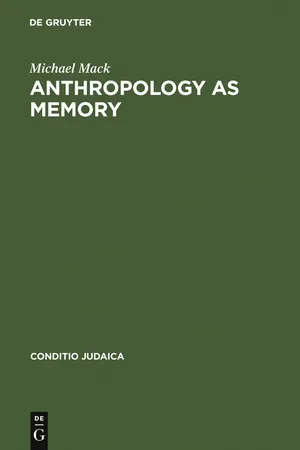
eBook - PDF
Anthropology as Memory
Elias Canetti's and Franz Baermann Steiner's Responses to the Shoah
- 236 pages
- English
- PDF
- Available on iOS & Android
eBook - PDF
Anthropology as Memory
Elias Canetti's and Franz Baermann Steiner's Responses to the Shoah
About this book
Whereas many other post-Holocaust Jewish thinkers - including Derrida - have concentrated on a refusal of totality and celebration of 'otherness', the poet and intellectual Franz Baermann Steiner (1909-1952) combines this emphasis with an equal stress on the 'need' for certain collectively acknowledged limits. Next to the wider significance of this book for discussions of Holocaust studies in relation to current theoretical and social issues, it will also offer a new interpretation of Elias Canetti's work. This is the first detailed examination of Steiner's anthropology and philosophy and its relation to the work of his close intellectual friend Canetti.
Tools to learn more effectively

Saving Books

Keyword Search

Annotating Text

Listen to it instead
Information
Table of contents
- Acknowledgements
- Introduction: The Holocaust, Literature, Anthropology and History
- Part I: Elias Canetti – Anthropology as Literature
- 1 Science, Power, Literature and the Holocaust
- 1.1 The Lack of an Intellectual and a Historical Context: The Holocaust and the Symbolic Exertion of Power
- 1.2 Canetti – A Ruler?
- 1.3 Canetti – A Scholar or a Writer?
- 2 Auto Da Fé as a Negative Poetics
- 3 Canetti’s Literary Devices for the Exertion of Power
- 3.1 Canetti’s Thinking in Images
- 3.2 Canetti’s Use of Philosophical and Anthropological Literature
- 3.3 Metamorphosis and Totemism
- 3.4 Death
- 3.5 Authority and Power
- Part II: Franz Baermann Steiner – Anthropology and Totalitarian Terror
- 4 Anthropology and the Perception of Non-Western Peoples
- 4.1 The German Background
- 4.2 The Influence of Marcel Mauss’s Conceptual Approach
- 4.3 The Context of British Anthropology
- 4.4 Steiner’s Relationship to British Anthropology
- 5 An Oriental Undermines Orientalism
- 5.1 Steiner’s »A Comparative Study of the Forms of Slavery« and Said’s Orientalism
- 5.2 Taboo
- 5.3 Civilization
- Part III: Style, Law and Danger
- 6 Elias Canetti’s and Franz Baermann Steiner’s Notion of Literature as Scholarship
- 7 Coincidences Between Steiner’s Anthropology and Poetry
- 8 Law, Myth and Danger
- Conclusion: Steiner’s and Canetti’s Contribution to Debates About Postmodernity
- Bibliography
- Index
Frequently asked questions
Yes, you can cancel anytime from the Subscription tab in your account settings on the Perlego website. Your subscription will stay active until the end of your current billing period. Learn how to cancel your subscription
No, books cannot be downloaded as external files, such as PDFs, for use outside of Perlego. However, you can download books within the Perlego app for offline reading on mobile or tablet. Learn how to download books offline
Perlego offers two plans: Essential and Complete
- Essential is ideal for learners and professionals who enjoy exploring a wide range of subjects. Access the Essential Library with 800,000+ trusted titles and best-sellers across business, personal growth, and the humanities. Includes unlimited reading time and Standard Read Aloud voice.
- Complete: Perfect for advanced learners and researchers needing full, unrestricted access. Unlock 1.4M+ books across hundreds of subjects, including academic and specialized titles. The Complete Plan also includes advanced features like Premium Read Aloud and Research Assistant.
We are an online textbook subscription service, where you can get access to an entire online library for less than the price of a single book per month. With over 1 million books across 990+ topics, we’ve got you covered! Learn about our mission
Look out for the read-aloud symbol on your next book to see if you can listen to it. The read-aloud tool reads text aloud for you, highlighting the text as it is being read. You can pause it, speed it up and slow it down. Learn more about Read Aloud
Yes! You can use the Perlego app on both iOS and Android devices to read anytime, anywhere — even offline. Perfect for commutes or when you’re on the go.
Please note we cannot support devices running on iOS 13 and Android 7 or earlier. Learn more about using the app
Please note we cannot support devices running on iOS 13 and Android 7 or earlier. Learn more about using the app
Yes, you can access Anthropology as Memory by Michael Mack in PDF and/or ePUB format, as well as other popular books in History & Jewish History. We have over one million books available in our catalogue for you to explore.